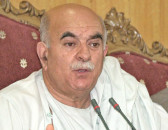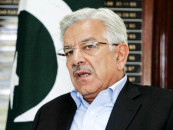Classical concert: Carrying the legacy forward
Young musicians sing and play for the audience.

instrumentalists recreating the magic of legendary musicians. PHOTO: EXPRESS
Kamal Shaukat was the star in the limelight as he set out to perform at a classical concert on Wednesday evening. The son of renowned vocalist Shaukat Manzoor, he belongs to the Kang Gharana and has been singing since he was eight. The 21-year-old has performed in the country as well as abroad.
One can trace an uncanny resemblance to his father, especially when he attempts to emulate the same laidback style with a timid smile on his face. While he seems enthusiastic about carrying forth the legacy, he still has a long way to establish himself as musician in the realm of the centuries-old tradition.
Exuding some nervous energy on the stage, he warmed up to the small audience gradually, opening the show with Khawaja Ghulam Farid’s kaafi “Sanwal more muharan.” He was accompanied by the instrumentalists Amanat Ali on tabla and Nadeem on keyboard.
The young vocalist’s rendition of the romantic ghazal “Kaash aisa koi manzar hota” was gentle and soul-stirring, with the intertwined notes of tabla and keyboard rising and falling in sync with the soft melody. The trio also performed the thumri “Keysaria Balam” and the ghazal “Mehkaday band karay.”
The young vocalist’s face lighted up as he performed his uncle Shaukat Ali’s composition of “Kadi te hans bol” in what seemed a subtle improvisation of the original score. The familiar folk tune had some in the audience clapping to the upbeat rhythm.
Amir Hussain, son of Manzoor Hussain from the Kapurthala Gharana, an accomplished sitar player, was calm and collected as he came centre stage.
Mindful of the fact that the art form is on the verge of extinction, he said it was an asset and had to be preserved. “In the classical music business, we have experienced continuous losses but we still persevere because it is good music and good music must be kept alive,” he said.
Sharing the origin of the various ragas, Hussain said that the mystic poet Amir Khusro introduced the sitar, the harmonium and the tabla to the Indian subcontinent, breathing life into the music form.
“This rhythm is the soul of our culture,” he said, before progressing into the instrumental renditions of “Chaap tillak sab cheen” and Noor Jehan’s “Challo acha hua tum bhool gaye” with seamless ease.
Brig (retd) Shafi, an audience member, related a verse by the Persian poet Hafiz Sherazi which loosely translates as,”The sitar is a dry piece of wood and the string is dry too, then whose voice resonates through this instrument?”
The concert was organised by the Mausiqaar Welfare Trust that works for the promotion of both young and old classical musicians. “Through a series of performances each year, we aim to highlight a positive image of the country,” said the trust’s secretary general Shazia Javaid.
Published in The Express Tribune, March 28th, 2014.



















COMMENTS
Comments are moderated and generally will be posted if they are on-topic and not abusive.
For more information, please see our Comments FAQ